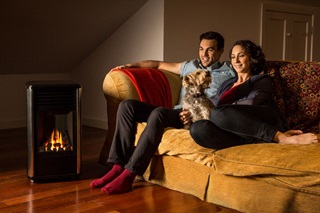Butane: An Affordable Heating Choice For Your Home

Butane and propane are both popular fuels for powering gas appliances, but they differ mainly in their freezing and boiling points.
Butane is an incredibly versatile fuel that goes far beyond just heating your home. While its primary role is to provide efficient indoor heating, here are some of the many popular butane gas uses:
Perfect for warming your home during chilly evenings, butane is a reliable choice for indoor heating appliances. Using a butane gas cylinder with a quality heater ensures consistent, efficient warmth that can help keep energy costs low.
Many portable stoves and kitchen appliances run efficiently on butane. It burns cleanly and provides a steady flame, making it ideal for everything from indoor cooking to preparing meals while camping.
Whether you're enjoying your patio or garden, butane can power outdoor heaters that create a cosy ambience. Just remember to use these devices safely—ensure proper ventilation and place them away from flammable materials.
For those who love grilling, butane is a popular alternative to propane. When deciding between the two, consider your appliance’s design and local fuel availability. Both fuels have their merits, but butane’s convenience makes it an attractive option for many outdoor enthusiasts.
Lightweight and portable, butane is a top choice for camping. It powers not only cooking stoves but also compact heaters, providing both warmth and a means to cook meals on the go.

Selecting the appropriate cylinder size is key to meeting your heating needs.
Butane contains 13.7 kilowatt-hours (kWh) per kilogram, so our 11.34kg butane gas cylinder provides approximately 155kWh of energy.
To put this into context, consider a typical 3-bar cabinet heater with different settings:
While the 11.34kg butane gas bottle is a popular choice, Calor also offers a smaller 5kg butane gas bottle option - perfect for indoor mobile heaters.
When it comes to using butane for heating, safety should always be the top priority. Follow these butane safety tips to protect you and your home:
Butane is a cost-effective alternative to oil heating—especially for homes not connected to the gas grid. Here’s how butane compares with other heating options:
Electric heaters offer great convenience, but they can become expensive when used over long periods, particularly during peak hours. Butane heating, on the other hand, tends to have lower running costs, making it a more economical choice for sustained use.
Oil heating usually comes with higher fuel expenses and the need for regular maintenance. In contrast, butane provides efficient, consistent warmth with lower overall costs, giving many households a competitive edge in managing their heating bills.
Selecting the perfect butane heater for your home involves more than just picking a model—it’s about matching the heater’s performance to your specific needs. Consider the following when making your choice:
Butane offers an affordable, efficient, and versatile heating solution for your home—whether you’re using it for indoor warmth, cooking, or even outdoor activities. With the right butane gas cylinder and heater selection, you can enjoy safe and economical heating all year round.
Ready to learn more? Visit our homepage for additional insights on home energy solutions.
Looking to buy a butane gas cylinder? Use our retailer finder to locate the nearest supplier.
Have further questions? Our team is here to help—drop by our Help Centre for more support